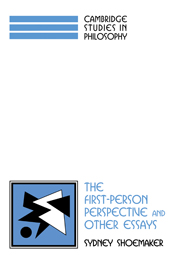
-
Select format
-
- Publisher:
- Cambridge University Press
- Publication date:
- January 2010
- September 1996
- ISBN:
- 9780511624674
- 9780521568715
- Dimensions:
- Weight & Pages:
- Dimensions:
- (216 x 138 mm)
- Weight & Pages:
- 0.46kg, 300 Pages
You may already have access via personal or institutional login
Book description
Sydney Shoemaker is one of the most influential philosophers currently writing on philosophy of mind and metaphysics. The essays in this collection deal with the way in which we know our own minds, and with the nature of those mental states of which we have our most direct conscious awareness. Professor Shoemaker opposes the 'inner sense' conception of introspective self-knowledge. He defends the view that perceptual and sensory states have non-representational features - 'qualia' - that determine what it is like to have them. Amongst the other topics covered are the unity of consciousness, and the idea that the 'first-person perspective' gives a privileged route to philosophical understanding of the nature of mind. This major collection is sure to prove invaluable to all advanced students of the philosophy of mind and cognitive science.
Reviews
"I believe that Shomemaker's papers on self-knowledge and the nature of phenomenal consciousness . . . constitute a deeply original and systematic body of work on these most difficult and perplexing philosophical issues." --Jaegwon Kim, Brown University
"The book will, I am sure, be regarded as must-reading by philosophers of mind; the papers are at the cutting edge of discussion of knowledge of our own mental states." --Brian McLaughlin, Rutgers University
"This collection seems to me the plum among the many impressive recent philosophical treatments of consciousness and self-knowledge, and the most useful as a starting point for further work. Every turn is made brilliantly and plainly, with lucid, compelling argumentation...." Mark Crimmins, Dialogue
Contents
Metrics
Altmetric attention score
Full text views
Full text views help Loading metrics...
Loading metrics...
* Views captured on Cambridge Core between #date#. This data will be updated every 24 hours.
Usage data cannot currently be displayed.
Accessibility standard: Unknown
Why this information is here
This section outlines the accessibility features of this content - including support for screen readers, full keyboard navigation and high-contrast display options. This may not be relevant for you.
Accessibility Information
Accessibility compliance for the PDF of this book is currently unknown and may be updated in the future.


